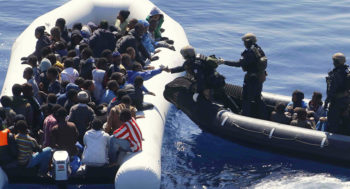
A deal with Libya that has slashed the number of migrants reaching Italy could scupper the ruling centre-left Democratic Party’s (PD) already dwindling hopes of staying in power next year as it is opposed by the PD’s potential coalition partners.
The deal, struck in February, is popular with the Italian public and with right-wing and anti-establishment parties now ahead in opinion polls, but it has drawn criticism from the United Nations, rights groups and many on Italy’s left.
Under the accord, Italy and the European Union pledged to finance migrant camps in Libya, and Rome also agreed to train the Libyan coastguard, part of a crackdown on migrants attempting the hazardous sea crossing to Europe.
But the deal has also led to tens of thousands of migrants being trapped in Libya, where humanitarian groups say they are locked up in appalling conditions, bought and sold, and subjected to crimes on a daily basis.
One politician who wants changes to the agreement is Emma Bonino, a former foreign minister in a centre-left government.
“I’ve always criticised this agreement with Libya. It’s a cork in a bottle that cannot hold,” Bonino told Reuters.
“Italians have the perception that they are being invaded by Muslim foreigners. It’s not true. Fear is fantastic for winning elections, but it’s simply useless for controlling migration.”
Bonino is considering forming a pro-EU party with other left-leaning figures that could support the PD ahead of next year’s national election, which must be held by May.
In other criticism of the Libya deal, Giulio Marcon, the top lawmaker in the lower house for the Italian Left party, said: “We cannot be complicit in migrant push backs.”
Left-wing voters hold humanitarian values dear, said Marcon, whose party has so far refused an alliance with the PD.
The PD needs the support of other parties, on the left in particular. It trailed the populist 5-Star Movement in a recent poll with 24 percent to 29 percent, while a centre-right coalition that includes the anti-immigrant Northern League, Silvio Berlusconi’s Forza Italia (Go Italy!) and the far-right Brothers of Italy has combined support totalling about 36 percent.
The deal with Libya, modelled on a similar one struck between the EU and Turkey, has been successful in reducing the flow of migrants into Italy, with arrivals down by about a third so far this year compared to the same period in 2016. In October alone arrivals were down about 80 percent from a year earlier.
Ordinary Italians, alarmed by the arrival of some 600,000 migrants in the past four years, have welcomed the trend. An SWG poll this month showed two thirds of Italians do not want more immigrants, fearing they will take away jobs and increase crime.
The Northern League, tapping into the anti-immigrant mood, has seen its popularity more than double to about 15 percent in three years. Its leader, Matteo Salvini, has accused “fake refugees” of “invading” Italy and bringing crime with them.
Not to be outdone, the 5-Star Movement’s candidate for prime minister, Luigi Di Maio, this summer accused charity ships rescuing migrants piled onto overcrowded and unseaworthy boats of being a “taxi service”.
Under the February deal, Libya’s coastguard has so far picked up about 20,000 migrants, including refugees. They are then forced into detention centres where they can be held indefinitely.
Last week the U.N. High Commissioner for Human Rights condemned the EU’s support for the Libyan coastguard as “inhuman” because intercepted migrants were imprisoned and subjected to “unimaginable horrors”.
Former U.N. secretary-general and Nobel Peace Prize winner Kofi Annan said the Libya deal suggested Italy was complicit in a breach of the Geneva Convention, which says refugees cannot be returned to a place where they may be persecuted.
“Under the Convention, you cannot push them (refugees) back. But if you make an arrangement with somebody else to keep them from moving, in a way you are complicit,” Annan said during a trip to Rome this month.
Agency Report